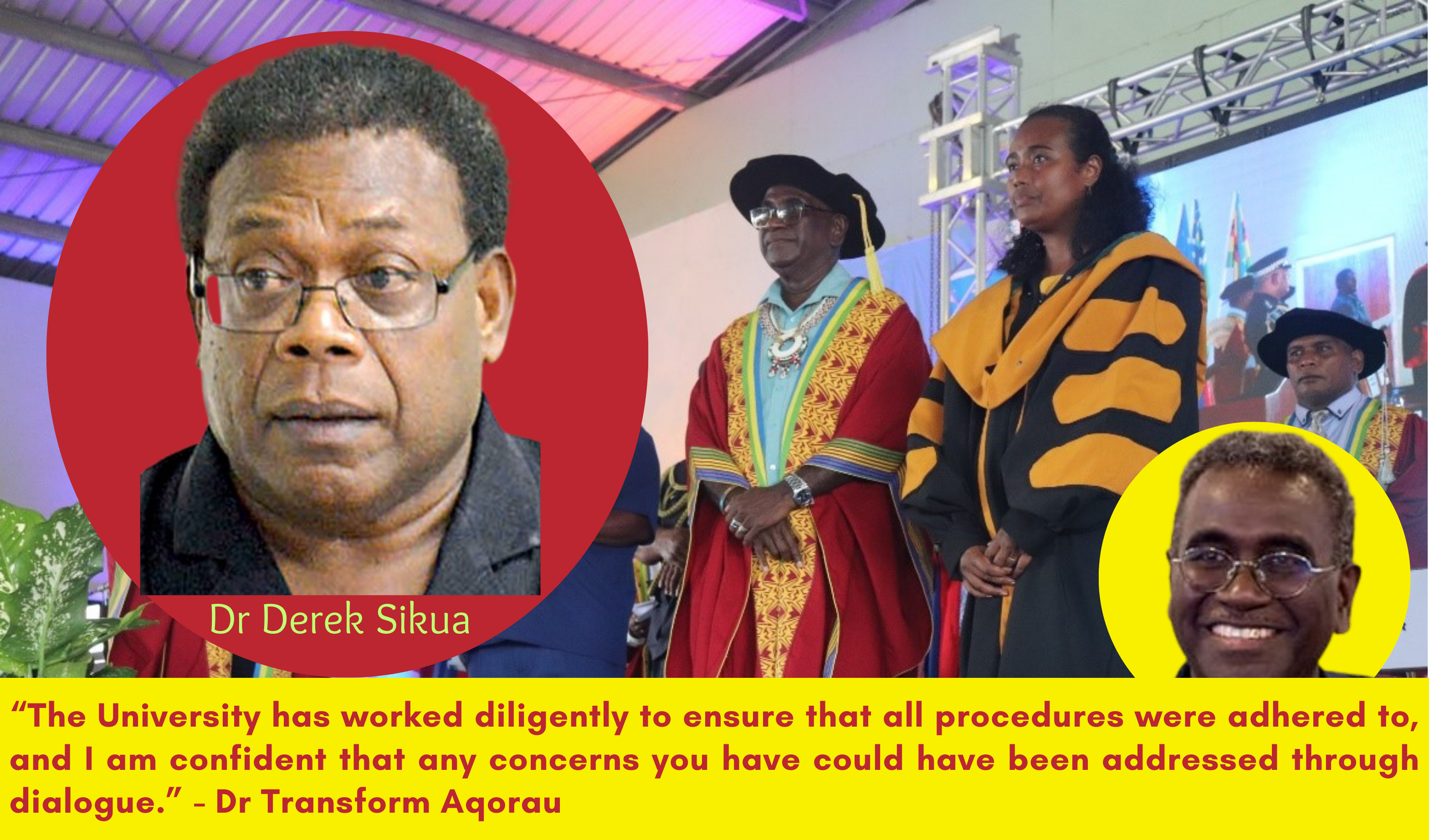
Vice Chancellor of Solomon Islands National University (SINU) Professor Transform Aqorau has requested former prime minister Dr Derek Sikua for a face-to-face discussion over his concerns about the university’s PhD programmes.
Sikua, who is also a former Permanent Secretary to the Ministry of Education, and longtime educator, said the “absence of proper procedures and processes for establishing, approving and assessing PhD programmes” at SINU is a concern.
His views were made in light of the recent award of the university’s first doctoral degree in Environmental Science to Mary Tahu, a Solomon Islander currently teaching at SINU.
In a 3rd September 2024 letter to Dr Morgan Wairiu, the Chair of SINU Council, Sikua said SINU does not have strong and appropriate processes and procedures to apply for, approve, establish and assess academic programmes, especially for a doctoral degree.
“The absence and/or weakness of such administrative and regulatory procedures raise questions about how SINU approves a PhD programme, its administration, the assessment processes, and hence the credibility of the degree,” Sikua said.
‘This could, in the long-term, raise questions about the academic rigour and quality of SINU’s PhD programmes and the degree conferred. And this could adversely affect the university’s reputation,” he added.
Responding to the concerns, Aqorau invited Sikua for a face-to-face conversation on the matter.
He said he’s committed to upholding the integrity of SINU’s academic processes, and assured Sikua that the PhD conferral followed due process in accordance with established academic policies.
“The University has worked diligently to ensure that all procedures were adhered to, and I am confident that any concerns you have could have been addressed through dialogue,” he stated in an email sent to Sikua.
“It would have been more fruitful, I believe, to discuss these issues in person rather than having to resort to a public discourse which may not lend itself to the full exchange of information and viewpoints that a meeting can provide,” Aqorau added.
“I remain open to meeting with you, along with my colleagues, to discuss your concerns thoroughly and transparently.
“I hold nothing back and have nothing to hide.
“We are prepared to engage with you in an open-minded and constructive manner before issuing any public response.
“I truly believe that such a discussion is not only fair but necessary, given the importance of the matter at hand and the potential implications for the University’s reputation and academic standing.”
Sikua raised four questions he said the SINU senior management needs to address, if the university’s PhD degrees are to be credible:
- Are there processes and procedures for faculties to apply for and be permitted to establish a PhD programme? What are the details of these procedures? Where can this information be found?
- What body in SINU assesses and determines whether there is a need for a PhD programme, whether the application procedures have been followed, and what are the criteria for determining these?
- Was a PhD programme in Environmental Science formally established at SINU? Did it follow procedures and processes and was it approved by the SINU Senate, Council and other appropriate authorities? When did this happen and where are the records? Are there records of the Faculty of Agriculture, Forestry and Fisheries (FAFF) applying for and receiving approval to establish a PhD programme? If not, how could the university award a doctoral degree in environmental science?
- Who were on the candidate’s thesis committee? Were they qualified to serve on the committee? The two core members of the graduate’s thesis committee include an academic trained in anthropology and political science, and another whose background is in international relations and peace and conflict studies with some work on environmental issues. Both have no qualification in environmental science. While they might have provided valuable advice on an interdisciplinary examination of the environment, it raises questions on whether they were qualified to be the core supervisors for a PhD degree in environmental sciences. While a professor from the University of Queensland provided “external support”, the core supervisors had no qualification in the discipline in which the PhD degree was conferred. It also raises questions about whether SINU has mechanisms and guidelines for engaging outside professors to serve on PhD committees.
He said while it is good to see SINU offer and award higher degrees, it is important to ensure that proper procedures and regulatory mechanisms are put in place to ensure academic rigour, high standards are established and maintained, and the university’s integrity is protected.
Established in 2013, SINU is Solomon Islands only university that has trained thousands of Solomon Islanders since then.
It currently has five faculties namely Faculty of Business & Tourism Studies, Faculty of Science & Technology, Faculty of Nursing, Medicine & Health Sciences, Faculty of Agriculture, Fisheries & Forestry and Faculty of Education & Humanities.
SINU has three campuses, which include Kukum, Ranadi and Panatina campuses.

